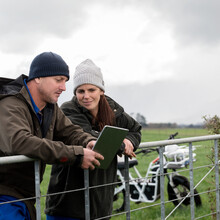Greenhouse Gases and Climate Change
Agricultural Greenhouse Gases (GHGs)
Download the presentation by Ants Roberts, Chief Scientific Officer, Ravensdown who presented workshops to Southland Catchment Groups in March 2023.
GHG calculator - Know Your Numbers
By 2022, every sheep and beef farmer should ‘know their numbers’ – that is, have calculated their Greenhouse Gas (GHG) emissions and sequestration. Funded by the Red Meat Profit Partnership, the GHG Calculator is a tool for red meat farmers to measure and report on-farm GHG emissions and sequestration. It is simple, accurate and reflects the individual farm’s situation
Greenhouse gas management and mitigation for sheep and beef farmers
New Zealand’s agricultural sector has a role to play to contribute to meeting specific greenhouse gas emission reduction targets, as part of international commitments on climate change and in the Zero Carbon Act.
This resource looks at some of the options available to reduce GHG emissions on Sheep and Beef properties
Know your numbers
Being prepared for the future means 'knowing your numbers' in relation to both profit and environmental performance indicators to give clarity on potential adaption required for your farm system.
PROVIDER
DairyNZ
AgMatters - Know your numbers
Knowing what your farm’s greenhouse gas emissions are and where they come from is the first step towards reducing them. All farmers and growers in New Zealand will have to know their greenhouse gas numbers by December 2022 and have a written plan in place for managing them by December 2024.
PROVIDER
MPI
Getting to know and manage on-farm Greenhouse Gas (GHG) Emissions
This fact sheet looks at managing on-farm Greenhouse Gas (GHG) emissions and offers practical steps to putting together an emissions reduction plan
PROVIDER
BNZ
Climate Change Research
DairyNZ is involved in a wide range of research, investing dairy farmers’ levy in climate change solutions developed through science.
PROVIDER
DairyNZ
Reducing Greenhouse Gas Emissions on dairy farms
It is estimated that biological emissions can be reduced by up to 10 percent for the dairy sector with currently available farm management practices.
PROVIDER
DairyNZ
The environmental benefits of arable feeds in the dairy diet
Podcast: About the benefits mixed dairy diets to reduce urinary n levels and GHG emissions.
PROVIDER
FAR - Foundation for Arable Research
AgMatters - Reduce methane emissions
Agriculture contributes just over 48% of New Zealand’s total greenhouse gas emissions. Methane belched out by ruminant animals is responsible for 71% of our total agricultural emissions. Reducing methane is essential if New Zealand is to meet its national and international targets.
PROVIDER
MPI
AgMatters
What actions can New Zealand farmers consider in an effort to reduce on-farm emissions of greenhouse gases while maintaining a profitable business?
PROVIDER
MPI
AgMatters - Reduce methane emissions
Agriculture contributes just over 48% of New Zealand’s total greenhouse gas emissions. Methane belched out by ruminant animals is responsible for 71% of our total agricultural emissions. Reducing methane is essential if New Zealand is to meet its national and international targets.
PROVIDER
MPI
AgMatters - Reduce nitrous oxide emissions
Nitrous oxide is a tiny component of the atmosphere but a potent and long-lived greenhouse gas. It accounts for 12% of New Zealand's total greenhouse gas emissions. Most nitrous oxide emissions arise from agriculture. The Government has set a target of reducing nitrous oxide emissions to net zero by 2050, meaning on-farm action is critical.
PROVIDER
MPI




